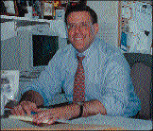On June 6, Charles Van Doren
returned to the Columbia campus quietly and without notoriety. No
major university campus had been the recipient of his vibrant voice
and keen intellect in the 40 years since his fall from grace as the
titular heir to the famous Van Doren legacy. Yet, there he was,
lecturing to us, the class of '59, at our 40th alumni reunion. It
seemed it was only yesterday that we had filled his lecture hall to
learn about Aristotle and Plato.
In this vast expanse of 40 years,
only the physical changes of the participants marked the distance
of time. Slender, with scholarly white hair and fine, pinched
features, upright posture and steady voice, the lecturer was in
full command of his audience, duly noting their attentiveness,
curiosity and respectful awe. He had never left.
However, the familiar content of the
lecture had changed. Ostensibly present to tell members of his
new/old class how to fulfill their remaining lives intellectually
and socially, his story of the journey of one mind was clearly an
allegory of his life, a life shaped by misfortune sown by the gods.
The absence of good fortune was despair; like Virgil's Aeneas, one
plunges to Hell and must return with great difficulty along a
tortuous path to Heaven. To achieve celebrity status was analogous
to fame without honor. Aeneas would eventually attempt to heed his
father's advice --to study justice and not scorn the
gods.
The message, no matter how poignant,
was dwarfed by the messenger, both by his presence and his
irrefutable decision to share this painful odyssey. There was no
mea culpa, no apology, only the refrain of the classics now being
rekindled by a decent and sincere soul emerging from a tragic
experience. The author of The
History of Knowledge emerged
before us from a lacuna of 40 years to touch us intellectually and
emotionally. In the end, our applause and his tears brought his
journey full circle, overlapping our lives and making us wonder
what might have been if the gods were not so quick to judge and so
slow to forgive.

